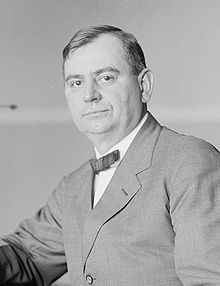Howard Mason Gore
Howard Mason Gore (born October 12, 1877 in Harrison County , West Virginia , † June 20, 1947 in Clarksburg , West Virginia) was an American politician and from 1925 to 1929 the 17th governor of the state of West Virginia. He had previously been a member of the cabinet of US President Calvin Coolidge as Secretary of Agriculture since 1924 .
Early years and political advancement
Howard Gore was born on a Harrison County farm that had been in his mother's family since 1778. He attended local schools in his home country and then studied agriculture at West Virginia University . After graduating in 1900, he worked as a farmer and rancher. Between 1912 and 1916 he served as president of the West Virginia Animal Husbandry Association. In addition, he was also active in the banking and hotel business. During World War I he was employed in the West Virginia grocery administration office. After the war, he served initially as deputy US Secretary of Agriculture before he was a member of the Coolidge Cabinet as Secretary of Agriculture from November 22, 1924 . After he was elected as a candidate for the Republican Party for governor of West Virginia, he resigned from the post.
West Virginia Governor
Gore's four-year term began on March 4, 1925. During his tenure, he had promoted agriculture. But he also made a name for himself with the expansion of the road network. Since he was in office at a time of economic boom, he had more budget funds available for the counties and municipalities of the country. Finally, he also campaigned for better education and health policies.
Another résumé
Before the end of his term in office, he had unsuccessfully applied for a seat in the US Senate in 1928 . He became Secretary of Agriculture of West Virginia in 1931–32. He later sought this office again unsuccessfully. In those years he returned to raising livestock and was involved in many cattle auctions in West Virginia. In 1935, he was appointed the federal commissioner for economic recovery in Harrison County after the Great Depression. Between 1941 and 1947 he was a member of a commission in West Virginia that oversaw public service services ( Public Service Commission ).
Web links
- Howard Mason Gore in the database of the National Governors Association (English)
- The governors of West Virginia (English)
- Howard Mason Gore in the Miller Center of Public Affairs of the University of Virginia (English)
- Howard Mason Gore in the database of Find a Grave (English)
| personal data | |
|---|---|
| SURNAME | Gore, Howard Mason |
| BRIEF DESCRIPTION | American politician |
| DATE OF BIRTH | October 12, 1877 |
| PLACE OF BIRTH | Harrison County , West Virginia |
| DATE OF DEATH | June 20, 1947 |
| Place of death | Clarksburg , West Virginia |


